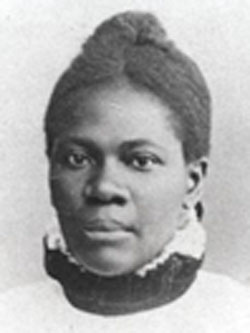Eliza Ann Grier, A Pioneer Against the Odds

By: Juhi Varshney
It seems impossible to imagine American medicine without a rich diversity of healthcare professionals, but not long ago many people were denied the ability to practice because of their race. African-American women were a salient group of Americans who had a legacy of caretaking throughout their history of being enslaved, but it was unthinkable for them to pursue medical degrees in order to provide specialized care. This all began to change once a handful of brave and hard-working pioneer black women forged their way through medical school and worked tirelessly to open their own practices. After overcoming insurmountable obstacles, Eliza Ann Grier was the first African American woman to practice medicine in the state of Georgia.
After enduring the unspeakable horrors of slavery, Eliza Ann Grier began anew as an emancipated woman with big dreams and an even bigger heart. She wanted to care for her community, and the best way for her to achieve that goal was to enroll in medical school. According to The National Library of Medicine, she had spent seven years studying at Fisk University in Nashville, but she longed for more. In December of 1890, Grier mustered the courage to write to the Women’s Medical College of Pennsylvania. She did not have the background nor did she have the funds required of a traditional medical student, but she had the passion and she had the heart. Eliza Ann Grier was accepted into the program, and she enrolled shortly thereafter.
Medical school introduced a new myriad of challenges, the biggest being its costly tuition. In order to support herself, Grier alternated terms of schooling with stints of picking cotton to raise the money she needed to pay her way through her education. She persevered in the face of adversity and refused to give up on her dream, and when she graduated in 1897 as one of the first black female doctors in the country, the fruits of her labor could not be sweeter. Later that year, she applied for a license to practice in Georgia and soon began working in Fulton county.
Returning to the South was not easy. African-American doctors and other healthcare professionals were not welcomed, and their lofty schooling did not buffer them against the discrimination they faced through segregation and Jim Crow laws, The Georgia Encyclopedia accounts. However, Grier was committed to improving the plight of the black community in the rural South, and she worked tirelessly to promote health and hygiene standards for all. She encountered nasty racism and sexism but she held fast in her mission and worked with other black leaders to precipitate positive change. Eliza Ann Grier continued to practice medicine, teach her skills to others at nearby hospitals, and stand as a leader and role model for the rest of her days.
Grier died in 1902 with a host of powerful friends, a life of committed service and an indelible legacy of triumph and success. Though she was only able to practice as a physician for a few years, she left her mark on history and paved a path for countless other black women to follow.

